Sustainable Education and Perspectives
VerifiedAdded on 2023/01/05
|16
|4021
|65
AI Summary
This report discusses the concept of sustainable education and perspectives, focusing on the implementation of sustainability practices in The Friends School of Australia. It explores the importance of creating awareness and providing knowledge about sustainability to students, teachers, and the community. The report also highlights the benefits of ecological learning and the limitations of its implementation.
Contribute Materials
Your contribution can guide someone’s learning journey. Share your
documents today.
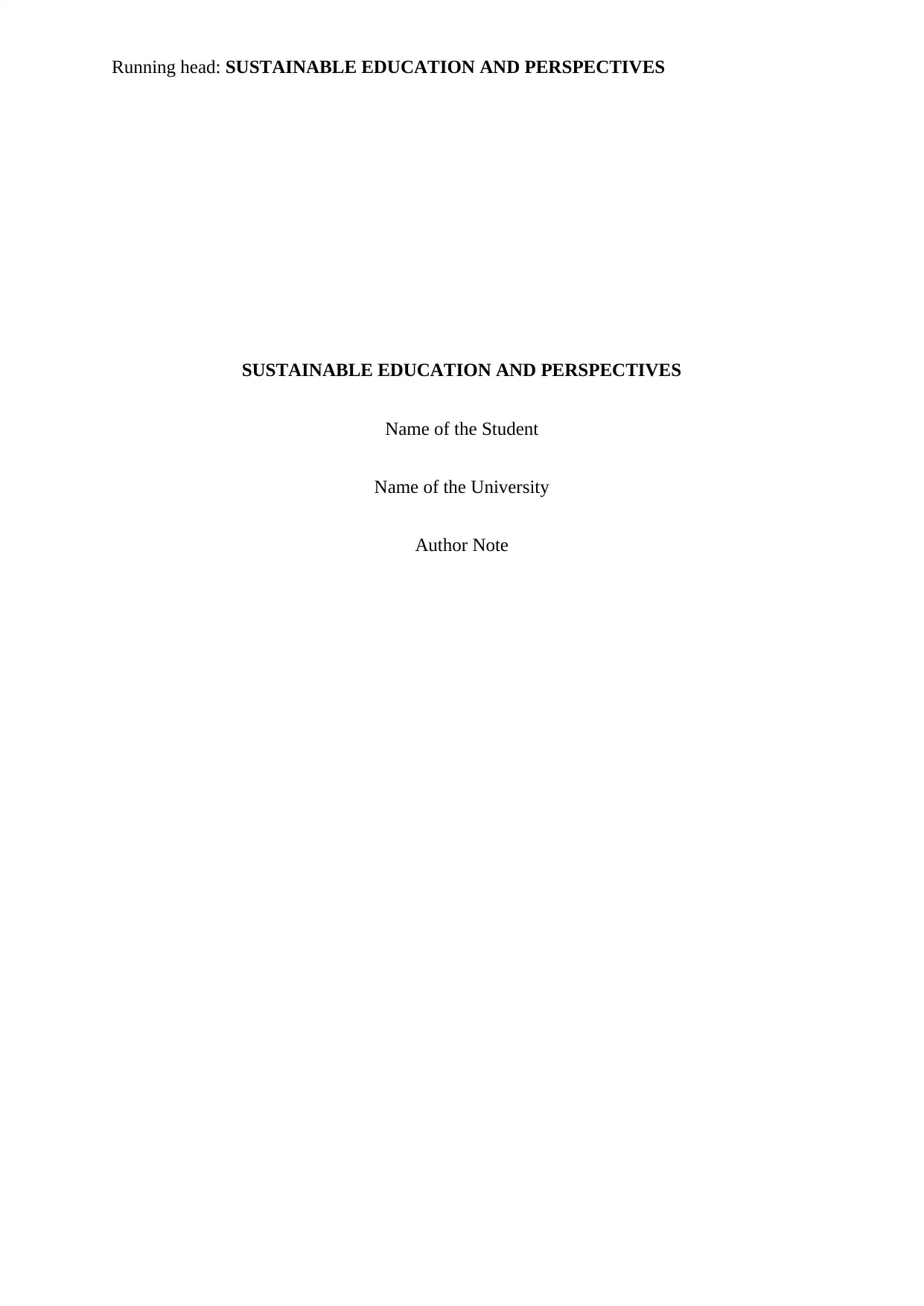
Running head: SUSTAINABLE EDUCATION AND PERSPECTIVES
SUSTAINABLE EDUCATION AND PERSPECTIVES
Name of the Student
Name of the University
Author Note
SUSTAINABLE EDUCATION AND PERSPECTIVES
Name of the Student
Name of the University
Author Note
Secure Best Marks with AI Grader
Need help grading? Try our AI Grader for instant feedback on your assignments.
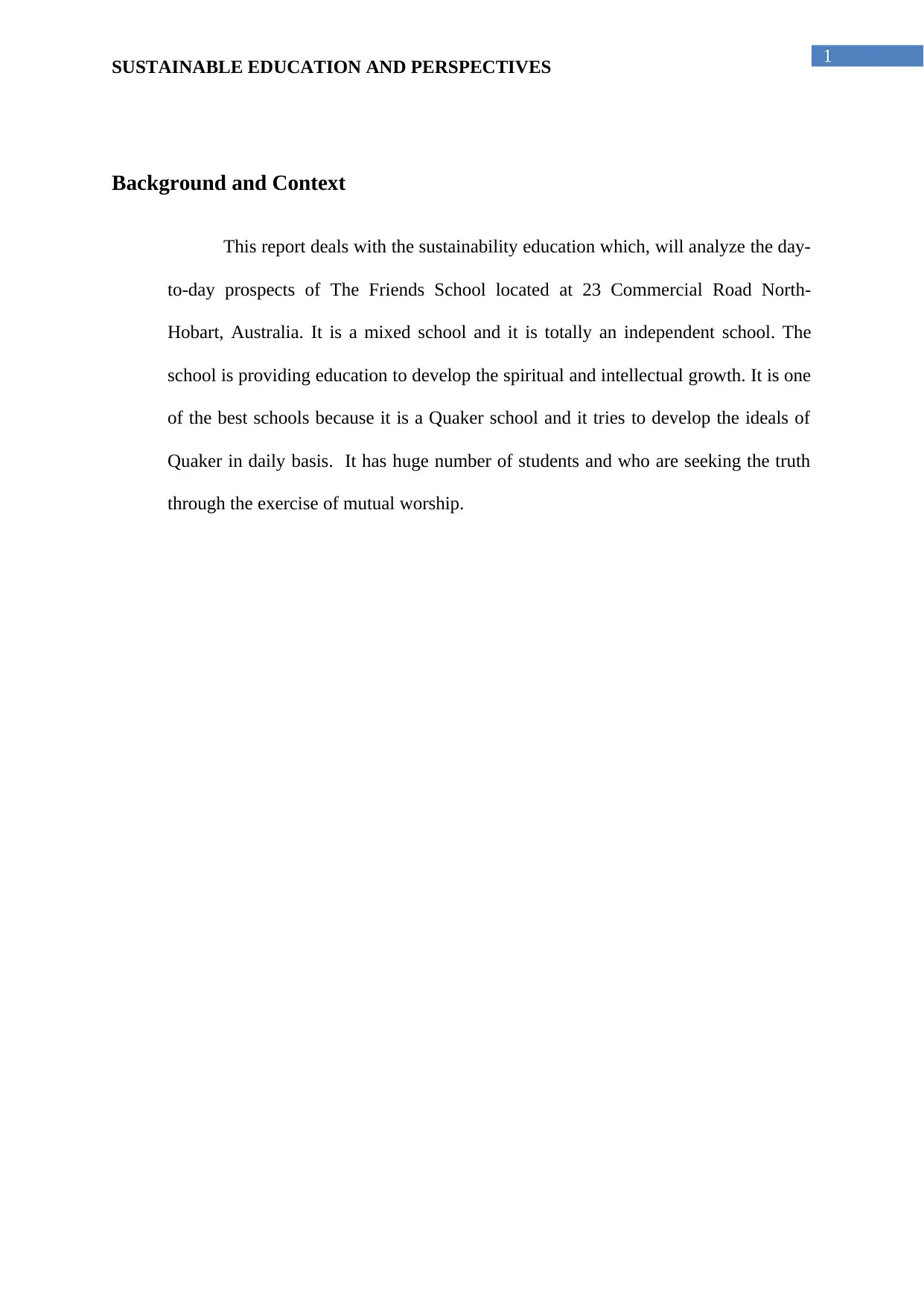
1
SUSTAINABLE EDUCATION AND PERSPECTIVES
Background and Context
This report deals with the sustainability education which, will analyze the day-
to-day prospects of The Friends School located at 23 Commercial Road North-
Hobart, Australia. It is a mixed school and it is totally an independent school. The
school is providing education to develop the spiritual and intellectual growth. It is one
of the best schools because it is a Quaker school and it tries to develop the ideals of
Quaker in daily basis. It has huge number of students and who are seeking the truth
through the exercise of mutual worship.
SUSTAINABLE EDUCATION AND PERSPECTIVES
Background and Context
This report deals with the sustainability education which, will analyze the day-
to-day prospects of The Friends School located at 23 Commercial Road North-
Hobart, Australia. It is a mixed school and it is totally an independent school. The
school is providing education to develop the spiritual and intellectual growth. It is one
of the best schools because it is a Quaker school and it tries to develop the ideals of
Quaker in daily basis. It has huge number of students and who are seeking the truth
through the exercise of mutual worship.
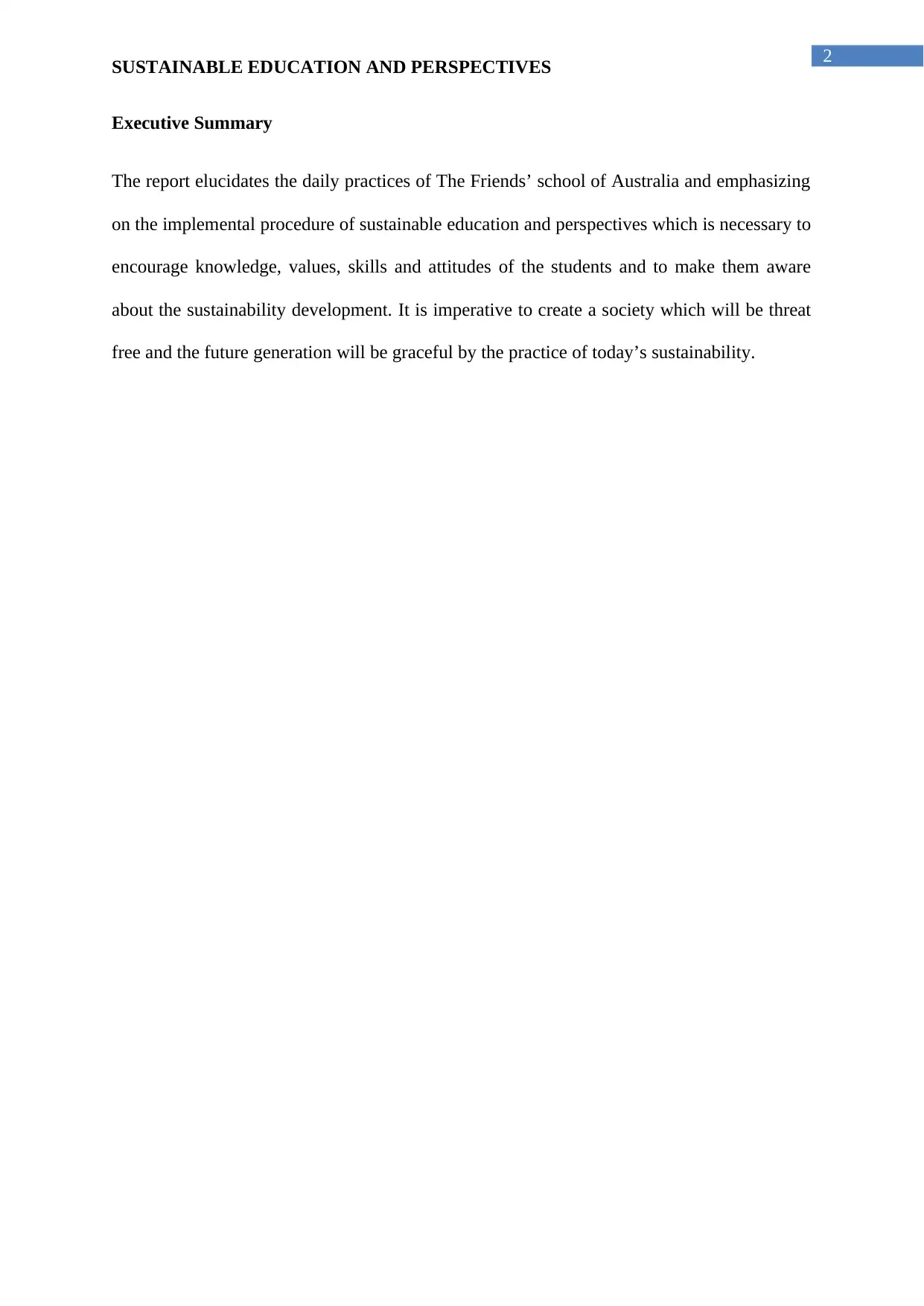
2
SUSTAINABLE EDUCATION AND PERSPECTIVES
Executive Summary
The report elucidates the daily practices of The Friends’ school of Australia and emphasizing
on the implemental procedure of sustainable education and perspectives which is necessary to
encourage knowledge, values, skills and attitudes of the students and to make them aware
about the sustainability development. It is imperative to create a society which will be threat
free and the future generation will be graceful by the practice of today’s sustainability.
SUSTAINABLE EDUCATION AND PERSPECTIVES
Executive Summary
The report elucidates the daily practices of The Friends’ school of Australia and emphasizing
on the implemental procedure of sustainable education and perspectives which is necessary to
encourage knowledge, values, skills and attitudes of the students and to make them aware
about the sustainability development. It is imperative to create a society which will be threat
free and the future generation will be graceful by the practice of today’s sustainability.
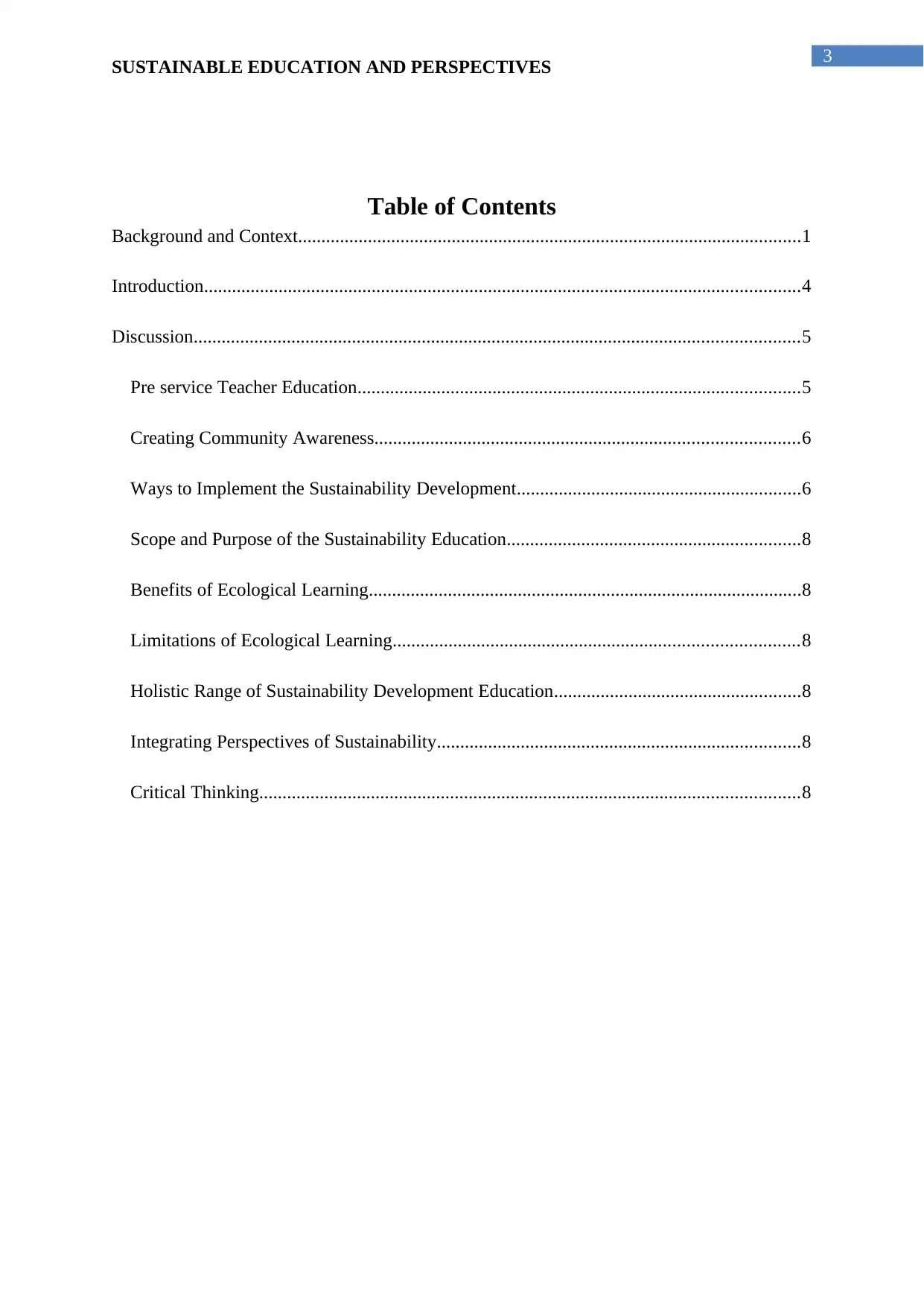
3
SUSTAINABLE EDUCATION AND PERSPECTIVES
Table of Contents
Background and Context............................................................................................................1
Introduction................................................................................................................................4
Discussion..................................................................................................................................5
Pre service Teacher Education...............................................................................................5
Creating Community Awareness...........................................................................................6
Ways to Implement the Sustainability Development.............................................................6
Scope and Purpose of the Sustainability Education...............................................................8
Benefits of Ecological Learning.............................................................................................8
Limitations of Ecological Learning.......................................................................................8
Holistic Range of Sustainability Development Education.....................................................8
Integrating Perspectives of Sustainability..............................................................................8
Critical Thinking....................................................................................................................8
SUSTAINABLE EDUCATION AND PERSPECTIVES
Table of Contents
Background and Context............................................................................................................1
Introduction................................................................................................................................4
Discussion..................................................................................................................................5
Pre service Teacher Education...............................................................................................5
Creating Community Awareness...........................................................................................6
Ways to Implement the Sustainability Development.............................................................6
Scope and Purpose of the Sustainability Education...............................................................8
Benefits of Ecological Learning.............................................................................................8
Limitations of Ecological Learning.......................................................................................8
Holistic Range of Sustainability Development Education.....................................................8
Integrating Perspectives of Sustainability..............................................................................8
Critical Thinking....................................................................................................................8
Secure Best Marks with AI Grader
Need help grading? Try our AI Grader for instant feedback on your assignments.
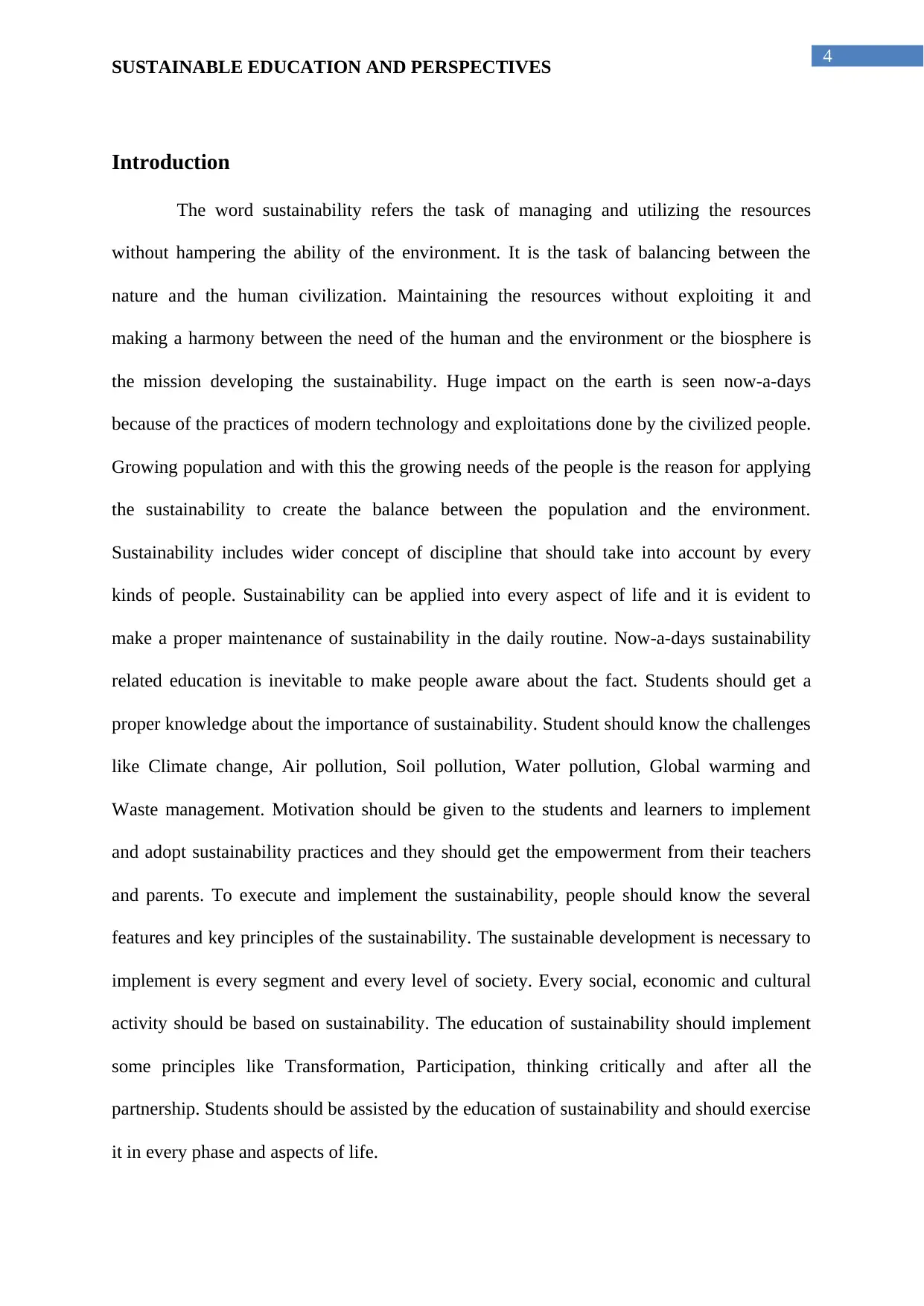
4
SUSTAINABLE EDUCATION AND PERSPECTIVES
Introduction
The word sustainability refers the task of managing and utilizing the resources
without hampering the ability of the environment. It is the task of balancing between the
nature and the human civilization. Maintaining the resources without exploiting it and
making a harmony between the need of the human and the environment or the biosphere is
the mission developing the sustainability. Huge impact on the earth is seen now-a-days
because of the practices of modern technology and exploitations done by the civilized people.
Growing population and with this the growing needs of the people is the reason for applying
the sustainability to create the balance between the population and the environment.
Sustainability includes wider concept of discipline that should take into account by every
kinds of people. Sustainability can be applied into every aspect of life and it is evident to
make a proper maintenance of sustainability in the daily routine. Now-a-days sustainability
related education is inevitable to make people aware about the fact. Students should get a
proper knowledge about the importance of sustainability. Student should know the challenges
like Climate change, Air pollution, Soil pollution, Water pollution, Global warming and
Waste management. Motivation should be given to the students and learners to implement
and adopt sustainability practices and they should get the empowerment from their teachers
and parents. To execute and implement the sustainability, people should know the several
features and key principles of the sustainability. The sustainable development is necessary to
implement is every segment and every level of society. Every social, economic and cultural
activity should be based on sustainability. The education of sustainability should implement
some principles like Transformation, Participation, thinking critically and after all the
partnership. Students should be assisted by the education of sustainability and should exercise
it in every phase and aspects of life.
SUSTAINABLE EDUCATION AND PERSPECTIVES
Introduction
The word sustainability refers the task of managing and utilizing the resources
without hampering the ability of the environment. It is the task of balancing between the
nature and the human civilization. Maintaining the resources without exploiting it and
making a harmony between the need of the human and the environment or the biosphere is
the mission developing the sustainability. Huge impact on the earth is seen now-a-days
because of the practices of modern technology and exploitations done by the civilized people.
Growing population and with this the growing needs of the people is the reason for applying
the sustainability to create the balance between the population and the environment.
Sustainability includes wider concept of discipline that should take into account by every
kinds of people. Sustainability can be applied into every aspect of life and it is evident to
make a proper maintenance of sustainability in the daily routine. Now-a-days sustainability
related education is inevitable to make people aware about the fact. Students should get a
proper knowledge about the importance of sustainability. Student should know the challenges
like Climate change, Air pollution, Soil pollution, Water pollution, Global warming and
Waste management. Motivation should be given to the students and learners to implement
and adopt sustainability practices and they should get the empowerment from their teachers
and parents. To execute and implement the sustainability, people should know the several
features and key principles of the sustainability. The sustainable development is necessary to
implement is every segment and every level of society. Every social, economic and cultural
activity should be based on sustainability. The education of sustainability should implement
some principles like Transformation, Participation, thinking critically and after all the
partnership. Students should be assisted by the education of sustainability and should exercise
it in every phase and aspects of life.
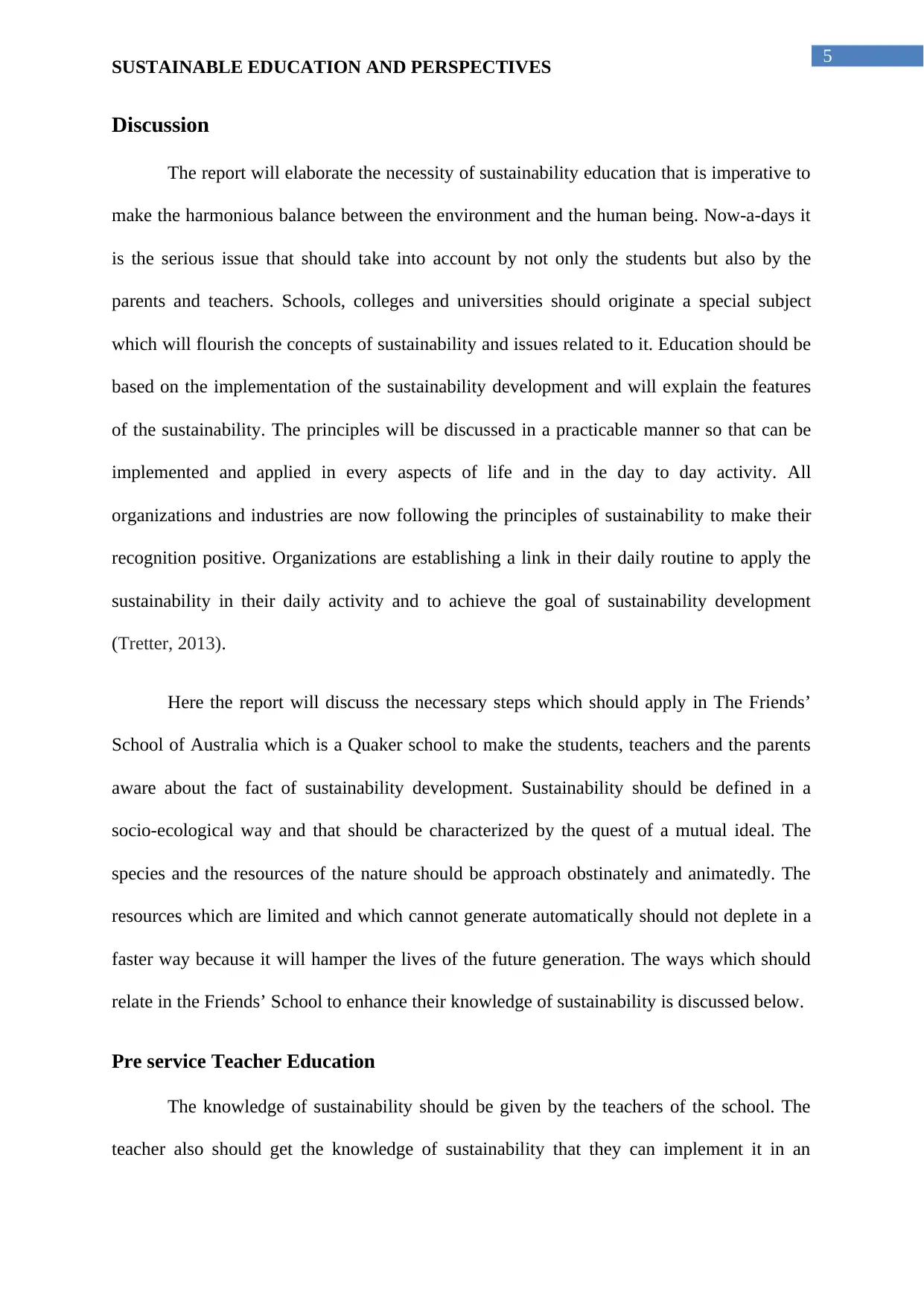
5
SUSTAINABLE EDUCATION AND PERSPECTIVES
Discussion
The report will elaborate the necessity of sustainability education that is imperative to
make the harmonious balance between the environment and the human being. Now-a-days it
is the serious issue that should take into account by not only the students but also by the
parents and teachers. Schools, colleges and universities should originate a special subject
which will flourish the concepts of sustainability and issues related to it. Education should be
based on the implementation of the sustainability development and will explain the features
of the sustainability. The principles will be discussed in a practicable manner so that can be
implemented and applied in every aspects of life and in the day to day activity. All
organizations and industries are now following the principles of sustainability to make their
recognition positive. Organizations are establishing a link in their daily routine to apply the
sustainability in their daily activity and to achieve the goal of sustainability development
(Tretter, 2013).
Here the report will discuss the necessary steps which should apply in The Friends’
School of Australia which is a Quaker school to make the students, teachers and the parents
aware about the fact of sustainability development. Sustainability should be defined in a
socio-ecological way and that should be characterized by the quest of a mutual ideal. The
species and the resources of the nature should be approach obstinately and animatedly. The
resources which are limited and which cannot generate automatically should not deplete in a
faster way because it will hamper the lives of the future generation. The ways which should
relate in the Friends’ School to enhance their knowledge of sustainability is discussed below.
Pre service Teacher Education
The knowledge of sustainability should be given by the teachers of the school. The
teacher also should get the knowledge of sustainability that they can implement it in an
SUSTAINABLE EDUCATION AND PERSPECTIVES
Discussion
The report will elaborate the necessity of sustainability education that is imperative to
make the harmonious balance between the environment and the human being. Now-a-days it
is the serious issue that should take into account by not only the students but also by the
parents and teachers. Schools, colleges and universities should originate a special subject
which will flourish the concepts of sustainability and issues related to it. Education should be
based on the implementation of the sustainability development and will explain the features
of the sustainability. The principles will be discussed in a practicable manner so that can be
implemented and applied in every aspects of life and in the day to day activity. All
organizations and industries are now following the principles of sustainability to make their
recognition positive. Organizations are establishing a link in their daily routine to apply the
sustainability in their daily activity and to achieve the goal of sustainability development
(Tretter, 2013).
Here the report will discuss the necessary steps which should apply in The Friends’
School of Australia which is a Quaker school to make the students, teachers and the parents
aware about the fact of sustainability development. Sustainability should be defined in a
socio-ecological way and that should be characterized by the quest of a mutual ideal. The
species and the resources of the nature should be approach obstinately and animatedly. The
resources which are limited and which cannot generate automatically should not deplete in a
faster way because it will hamper the lives of the future generation. The ways which should
relate in the Friends’ School to enhance their knowledge of sustainability is discussed below.
Pre service Teacher Education
The knowledge of sustainability should be given by the teachers of the school. The
teacher also should get the knowledge of sustainability that they can implement it in an
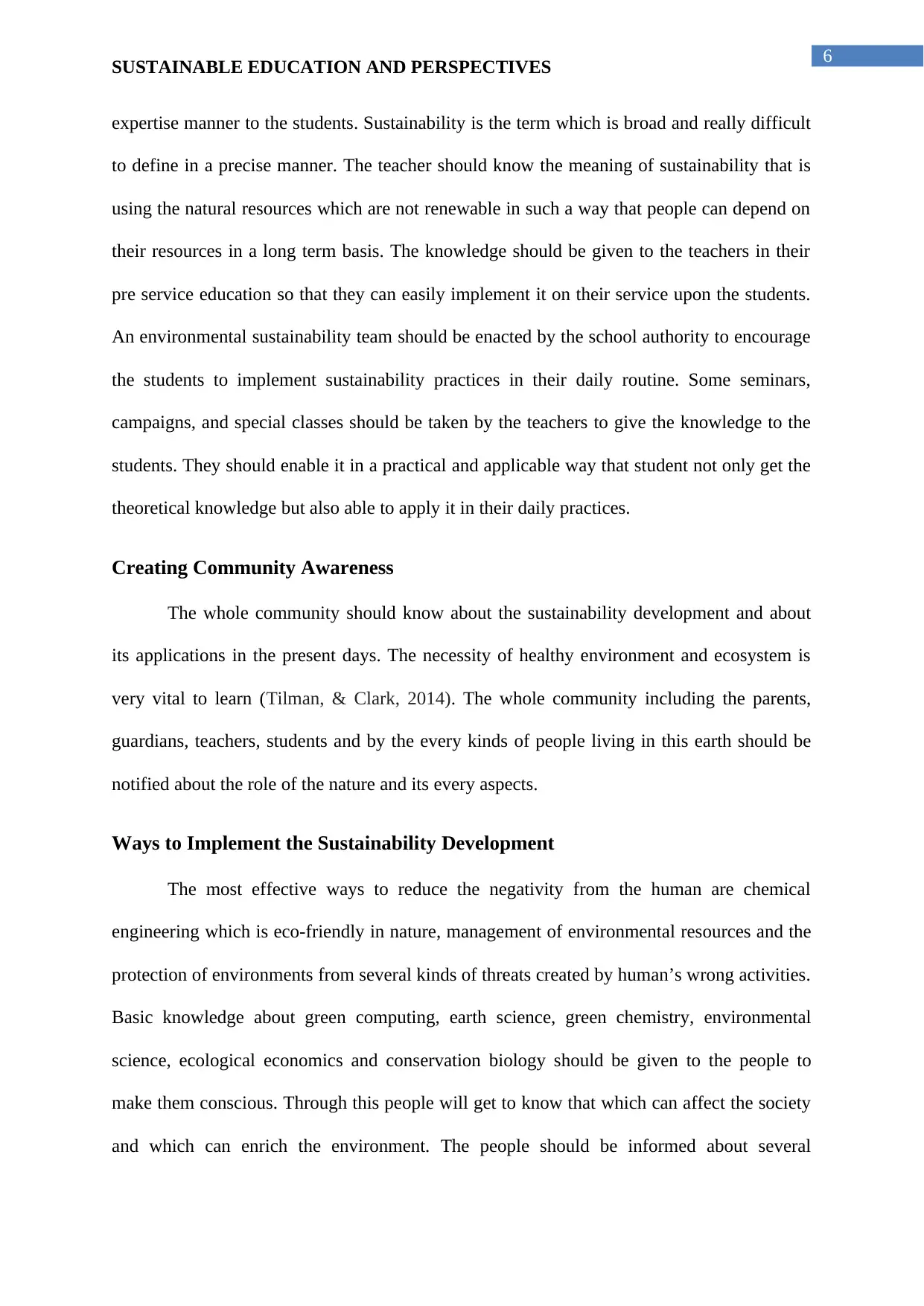
6
SUSTAINABLE EDUCATION AND PERSPECTIVES
expertise manner to the students. Sustainability is the term which is broad and really difficult
to define in a precise manner. The teacher should know the meaning of sustainability that is
using the natural resources which are not renewable in such a way that people can depend on
their resources in a long term basis. The knowledge should be given to the teachers in their
pre service education so that they can easily implement it on their service upon the students.
An environmental sustainability team should be enacted by the school authority to encourage
the students to implement sustainability practices in their daily routine. Some seminars,
campaigns, and special classes should be taken by the teachers to give the knowledge to the
students. They should enable it in a practical and applicable way that student not only get the
theoretical knowledge but also able to apply it in their daily practices.
Creating Community Awareness
The whole community should know about the sustainability development and about
its applications in the present days. The necessity of healthy environment and ecosystem is
very vital to learn (Tilman, & Clark, 2014). The whole community including the parents,
guardians, teachers, students and by the every kinds of people living in this earth should be
notified about the role of the nature and its every aspects.
Ways to Implement the Sustainability Development
The most effective ways to reduce the negativity from the human are chemical
engineering which is eco-friendly in nature, management of environmental resources and the
protection of environments from several kinds of threats created by human’s wrong activities.
Basic knowledge about green computing, earth science, green chemistry, environmental
science, ecological economics and conservation biology should be given to the people to
make them conscious. Through this people will get to know that which can affect the society
and which can enrich the environment. The people should be informed about several
SUSTAINABLE EDUCATION AND PERSPECTIVES
expertise manner to the students. Sustainability is the term which is broad and really difficult
to define in a precise manner. The teacher should know the meaning of sustainability that is
using the natural resources which are not renewable in such a way that people can depend on
their resources in a long term basis. The knowledge should be given to the teachers in their
pre service education so that they can easily implement it on their service upon the students.
An environmental sustainability team should be enacted by the school authority to encourage
the students to implement sustainability practices in their daily routine. Some seminars,
campaigns, and special classes should be taken by the teachers to give the knowledge to the
students. They should enable it in a practical and applicable way that student not only get the
theoretical knowledge but also able to apply it in their daily practices.
Creating Community Awareness
The whole community should know about the sustainability development and about
its applications in the present days. The necessity of healthy environment and ecosystem is
very vital to learn (Tilman, & Clark, 2014). The whole community including the parents,
guardians, teachers, students and by the every kinds of people living in this earth should be
notified about the role of the nature and its every aspects.
Ways to Implement the Sustainability Development
The most effective ways to reduce the negativity from the human are chemical
engineering which is eco-friendly in nature, management of environmental resources and the
protection of environments from several kinds of threats created by human’s wrong activities.
Basic knowledge about green computing, earth science, green chemistry, environmental
science, ecological economics and conservation biology should be given to the people to
make them conscious. Through this people will get to know that which can affect the society
and which can enrich the environment. The people should be informed about several
Paraphrase This Document
Need a fresh take? Get an instant paraphrase of this document with our AI Paraphraser
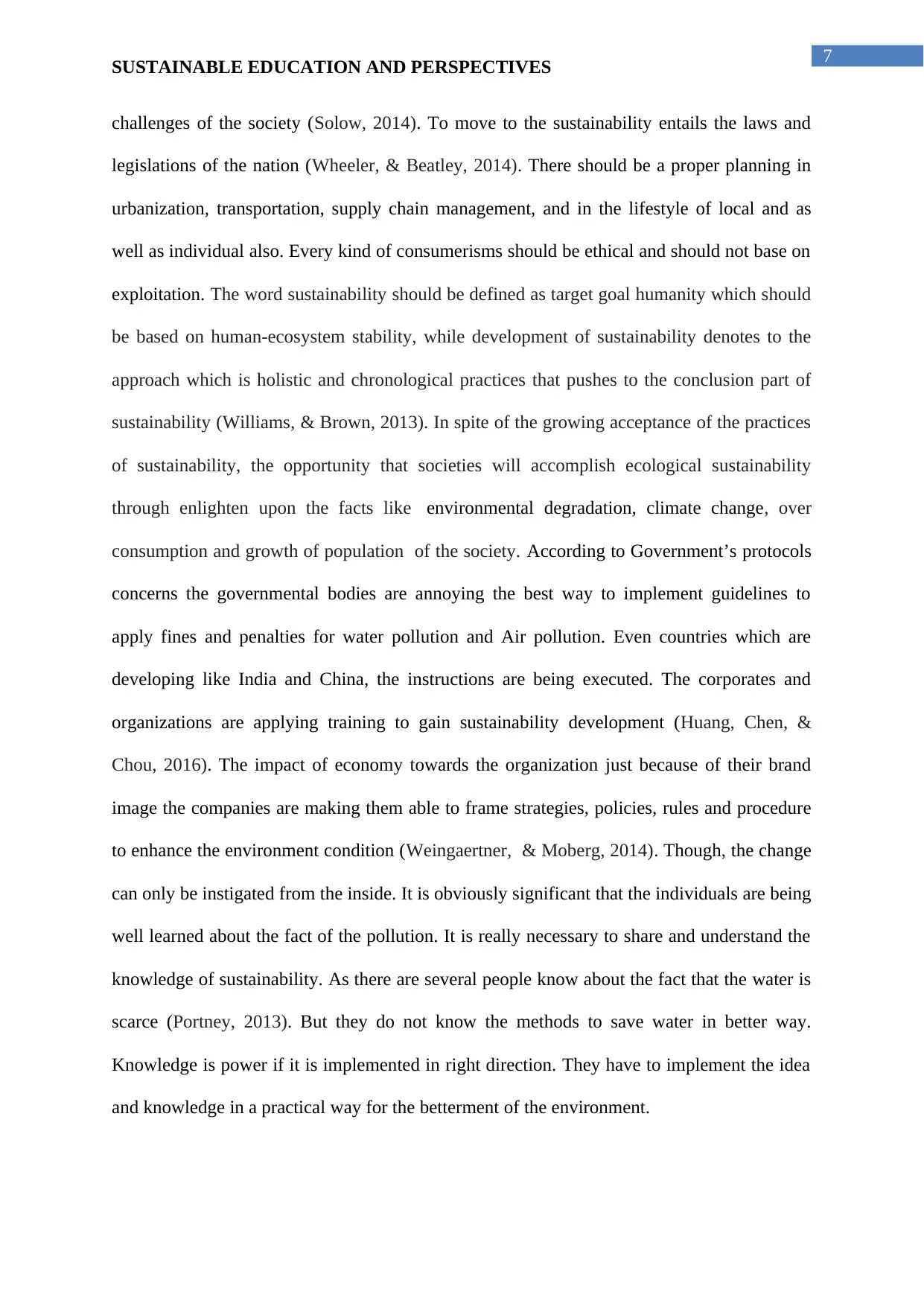
7
SUSTAINABLE EDUCATION AND PERSPECTIVES
challenges of the society (Solow, 2014). To move to the sustainability entails the laws and
legislations of the nation (Wheeler, & Beatley, 2014). There should be a proper planning in
urbanization, transportation, supply chain management, and in the lifestyle of local and as
well as individual also. Every kind of consumerisms should be ethical and should not base on
exploitation. The word sustainability should be defined as target goal humanity which should
be based on human-ecosystem stability, while development of sustainability denotes to the
approach which is holistic and chronological practices that pushes to the conclusion part of
sustainability (Williams, & Brown, 2013). In spite of the growing acceptance of the practices
of sustainability, the opportunity that societies will accomplish ecological sustainability
through enlighten upon the facts like environmental degradation, climate change, over
consumption and growth of population of the society. According to Government’s protocols
concerns the governmental bodies are annoying the best way to implement guidelines to
apply fines and penalties for water pollution and Air pollution. Even countries which are
developing like India and China, the instructions are being executed. The corporates and
organizations are applying training to gain sustainability development (Huang, Chen, &
Chou, 2016). The impact of economy towards the organization just because of their brand
image the companies are making them able to frame strategies, policies, rules and procedure
to enhance the environment condition (Weingaertner, & Moberg, 2014). Though, the change
can only be instigated from the inside. It is obviously significant that the individuals are being
well learned about the fact of the pollution. It is really necessary to share and understand the
knowledge of sustainability. As there are several people know about the fact that the water is
scarce (Portney, 2013). But they do not know the methods to save water in better way.
Knowledge is power if it is implemented in right direction. They have to implement the idea
and knowledge in a practical way for the betterment of the environment.
SUSTAINABLE EDUCATION AND PERSPECTIVES
challenges of the society (Solow, 2014). To move to the sustainability entails the laws and
legislations of the nation (Wheeler, & Beatley, 2014). There should be a proper planning in
urbanization, transportation, supply chain management, and in the lifestyle of local and as
well as individual also. Every kind of consumerisms should be ethical and should not base on
exploitation. The word sustainability should be defined as target goal humanity which should
be based on human-ecosystem stability, while development of sustainability denotes to the
approach which is holistic and chronological practices that pushes to the conclusion part of
sustainability (Williams, & Brown, 2013). In spite of the growing acceptance of the practices
of sustainability, the opportunity that societies will accomplish ecological sustainability
through enlighten upon the facts like environmental degradation, climate change, over
consumption and growth of population of the society. According to Government’s protocols
concerns the governmental bodies are annoying the best way to implement guidelines to
apply fines and penalties for water pollution and Air pollution. Even countries which are
developing like India and China, the instructions are being executed. The corporates and
organizations are applying training to gain sustainability development (Huang, Chen, &
Chou, 2016). The impact of economy towards the organization just because of their brand
image the companies are making them able to frame strategies, policies, rules and procedure
to enhance the environment condition (Weingaertner, & Moberg, 2014). Though, the change
can only be instigated from the inside. It is obviously significant that the individuals are being
well learned about the fact of the pollution. It is really necessary to share and understand the
knowledge of sustainability. As there are several people know about the fact that the water is
scarce (Portney, 2013). But they do not know the methods to save water in better way.
Knowledge is power if it is implemented in right direction. They have to implement the idea
and knowledge in a practical way for the betterment of the environment.
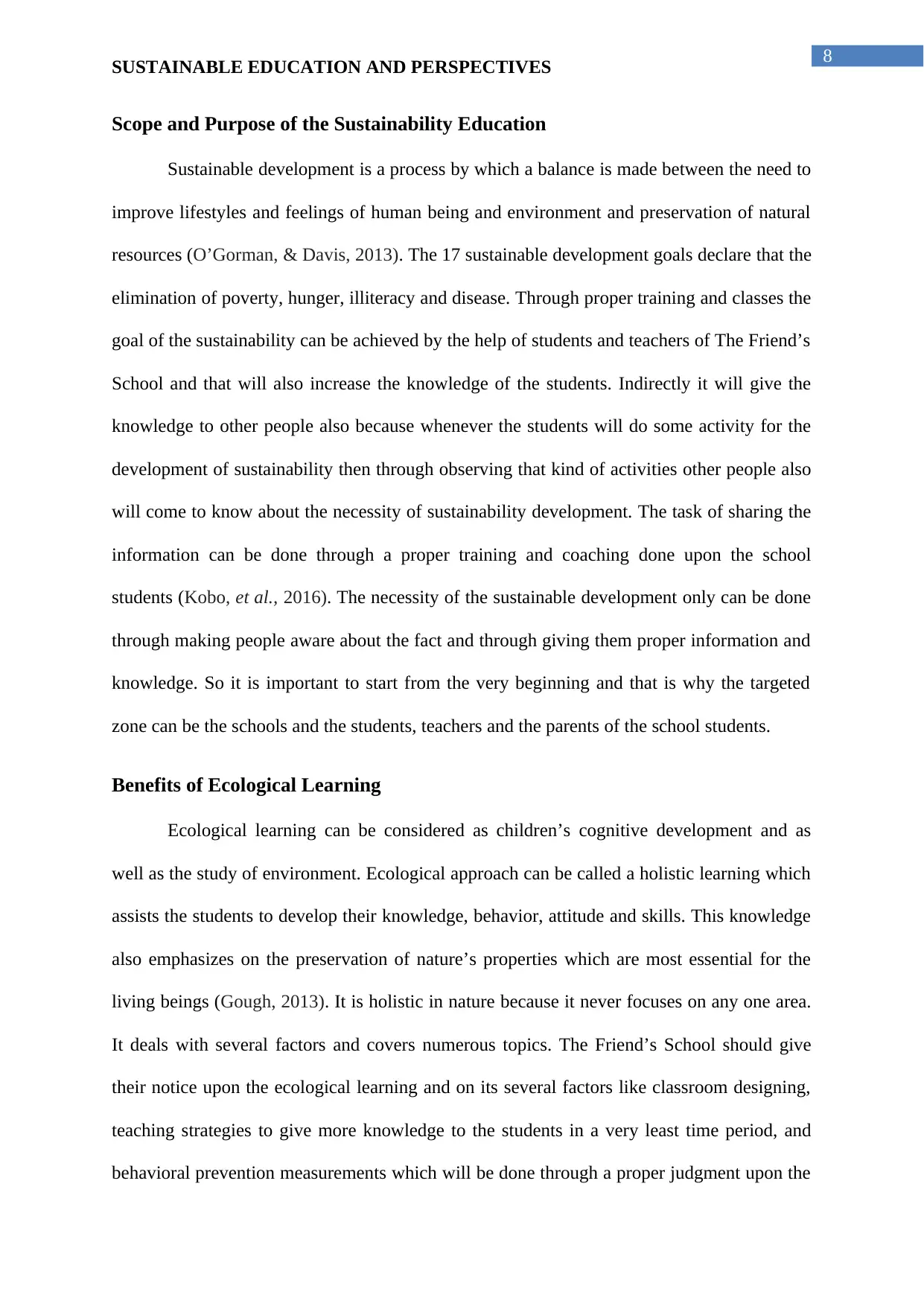
8
SUSTAINABLE EDUCATION AND PERSPECTIVES
Scope and Purpose of the Sustainability Education
Sustainable development is a process by which a balance is made between the need to
improve lifestyles and feelings of human being and environment and preservation of natural
resources (O’Gorman, & Davis, 2013). The 17 sustainable development goals declare that the
elimination of poverty, hunger, illiteracy and disease. Through proper training and classes the
goal of the sustainability can be achieved by the help of students and teachers of The Friend’s
School and that will also increase the knowledge of the students. Indirectly it will give the
knowledge to other people also because whenever the students will do some activity for the
development of sustainability then through observing that kind of activities other people also
will come to know about the necessity of sustainability development. The task of sharing the
information can be done through a proper training and coaching done upon the school
students (Kobo, et al., 2016). The necessity of the sustainable development only can be done
through making people aware about the fact and through giving them proper information and
knowledge. So it is important to start from the very beginning and that is why the targeted
zone can be the schools and the students, teachers and the parents of the school students.
Benefits of Ecological Learning
Ecological learning can be considered as children’s cognitive development and as
well as the study of environment. Ecological approach can be called a holistic learning which
assists the students to develop their knowledge, behavior, attitude and skills. This knowledge
also emphasizes on the preservation of nature’s properties which are most essential for the
living beings (Gough, 2013). It is holistic in nature because it never focuses on any one area.
It deals with several factors and covers numerous topics. The Friend’s School should give
their notice upon the ecological learning and on its several factors like classroom designing,
teaching strategies to give more knowledge to the students in a very least time period, and
behavioral prevention measurements which will be done through a proper judgment upon the
SUSTAINABLE EDUCATION AND PERSPECTIVES
Scope and Purpose of the Sustainability Education
Sustainable development is a process by which a balance is made between the need to
improve lifestyles and feelings of human being and environment and preservation of natural
resources (O’Gorman, & Davis, 2013). The 17 sustainable development goals declare that the
elimination of poverty, hunger, illiteracy and disease. Through proper training and classes the
goal of the sustainability can be achieved by the help of students and teachers of The Friend’s
School and that will also increase the knowledge of the students. Indirectly it will give the
knowledge to other people also because whenever the students will do some activity for the
development of sustainability then through observing that kind of activities other people also
will come to know about the necessity of sustainability development. The task of sharing the
information can be done through a proper training and coaching done upon the school
students (Kobo, et al., 2016). The necessity of the sustainable development only can be done
through making people aware about the fact and through giving them proper information and
knowledge. So it is important to start from the very beginning and that is why the targeted
zone can be the schools and the students, teachers and the parents of the school students.
Benefits of Ecological Learning
Ecological learning can be considered as children’s cognitive development and as
well as the study of environment. Ecological approach can be called a holistic learning which
assists the students to develop their knowledge, behavior, attitude and skills. This knowledge
also emphasizes on the preservation of nature’s properties which are most essential for the
living beings (Gough, 2013). It is holistic in nature because it never focuses on any one area.
It deals with several factors and covers numerous topics. The Friend’s School should give
their notice upon the ecological learning and on its several factors like classroom designing,
teaching strategies to give more knowledge to the students in a very least time period, and
behavioral prevention measurements which will be done through a proper judgment upon the
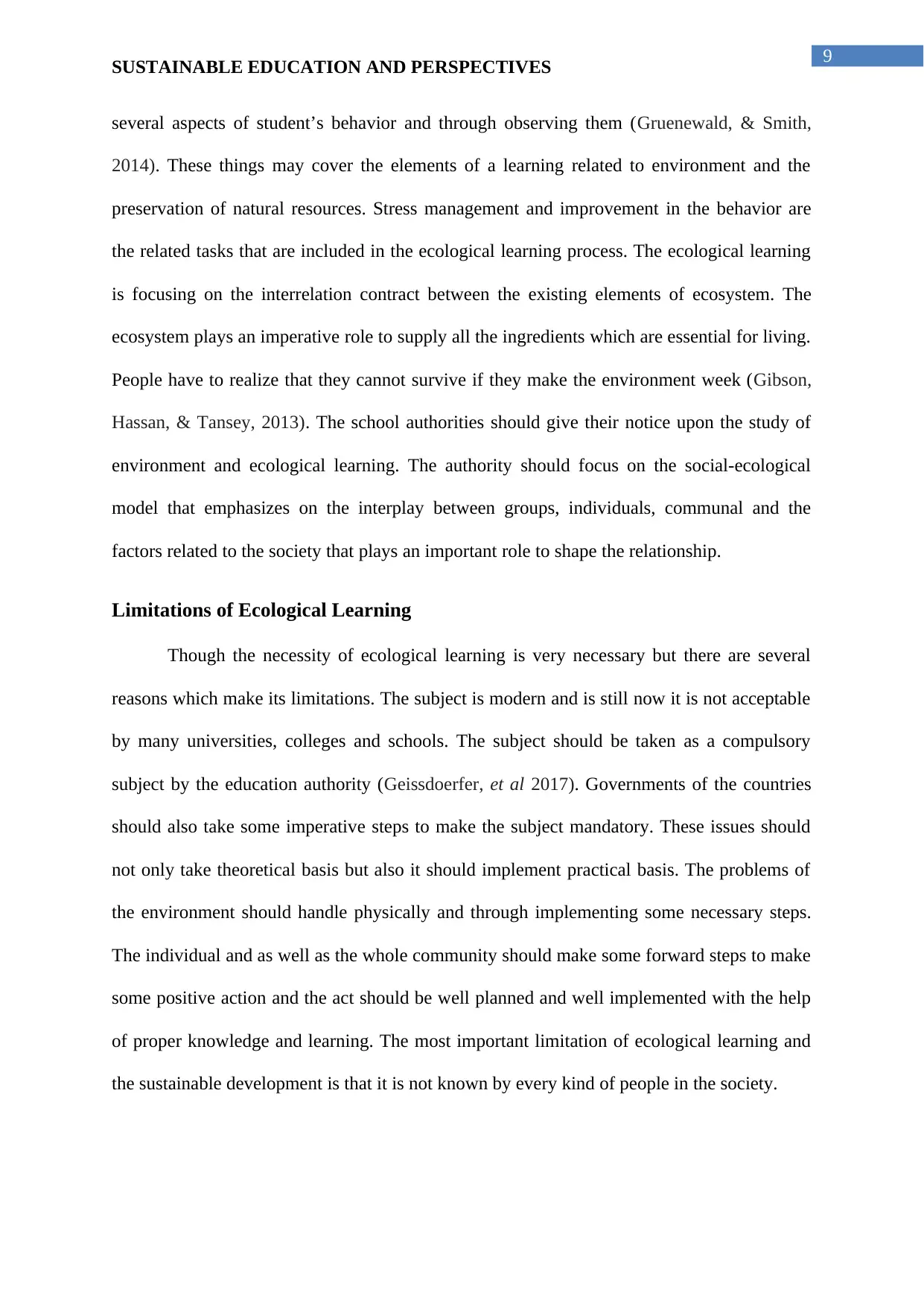
9
SUSTAINABLE EDUCATION AND PERSPECTIVES
several aspects of student’s behavior and through observing them (Gruenewald, & Smith,
2014). These things may cover the elements of a learning related to environment and the
preservation of natural resources. Stress management and improvement in the behavior are
the related tasks that are included in the ecological learning process. The ecological learning
is focusing on the interrelation contract between the existing elements of ecosystem. The
ecosystem plays an imperative role to supply all the ingredients which are essential for living.
People have to realize that they cannot survive if they make the environment week (Gibson,
Hassan, & Tansey, 2013). The school authorities should give their notice upon the study of
environment and ecological learning. The authority should focus on the social-ecological
model that emphasizes on the interplay between groups, individuals, communal and the
factors related to the society that plays an important role to shape the relationship.
Limitations of Ecological Learning
Though the necessity of ecological learning is very necessary but there are several
reasons which make its limitations. The subject is modern and is still now it is not acceptable
by many universities, colleges and schools. The subject should be taken as a compulsory
subject by the education authority (Geissdoerfer, et al 2017). Governments of the countries
should also take some imperative steps to make the subject mandatory. These issues should
not only take theoretical basis but also it should implement practical basis. The problems of
the environment should handle physically and through implementing some necessary steps.
The individual and as well as the whole community should make some forward steps to make
some positive action and the act should be well planned and well implemented with the help
of proper knowledge and learning. The most important limitation of ecological learning and
the sustainable development is that it is not known by every kind of people in the society.
SUSTAINABLE EDUCATION AND PERSPECTIVES
several aspects of student’s behavior and through observing them (Gruenewald, & Smith,
2014). These things may cover the elements of a learning related to environment and the
preservation of natural resources. Stress management and improvement in the behavior are
the related tasks that are included in the ecological learning process. The ecological learning
is focusing on the interrelation contract between the existing elements of ecosystem. The
ecosystem plays an imperative role to supply all the ingredients which are essential for living.
People have to realize that they cannot survive if they make the environment week (Gibson,
Hassan, & Tansey, 2013). The school authorities should give their notice upon the study of
environment and ecological learning. The authority should focus on the social-ecological
model that emphasizes on the interplay between groups, individuals, communal and the
factors related to the society that plays an important role to shape the relationship.
Limitations of Ecological Learning
Though the necessity of ecological learning is very necessary but there are several
reasons which make its limitations. The subject is modern and is still now it is not acceptable
by many universities, colleges and schools. The subject should be taken as a compulsory
subject by the education authority (Geissdoerfer, et al 2017). Governments of the countries
should also take some imperative steps to make the subject mandatory. These issues should
not only take theoretical basis but also it should implement practical basis. The problems of
the environment should handle physically and through implementing some necessary steps.
The individual and as well as the whole community should make some forward steps to make
some positive action and the act should be well planned and well implemented with the help
of proper knowledge and learning. The most important limitation of ecological learning and
the sustainable development is that it is not known by every kind of people in the society.
Secure Best Marks with AI Grader
Need help grading? Try our AI Grader for instant feedback on your assignments.
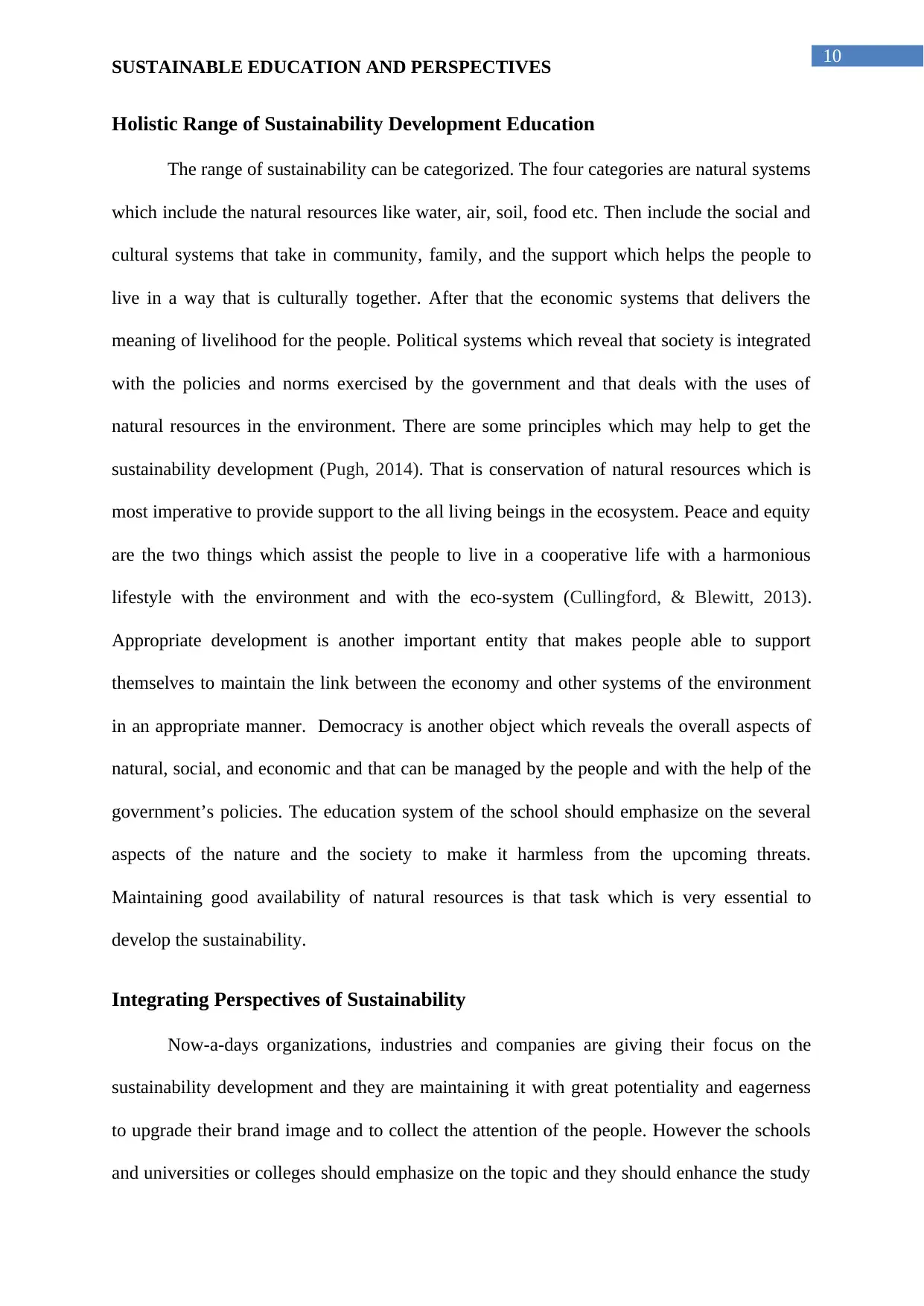
10
SUSTAINABLE EDUCATION AND PERSPECTIVES
Holistic Range of Sustainability Development Education
The range of sustainability can be categorized. The four categories are natural systems
which include the natural resources like water, air, soil, food etc. Then include the social and
cultural systems that take in community, family, and the support which helps the people to
live in a way that is culturally together. After that the economic systems that delivers the
meaning of livelihood for the people. Political systems which reveal that society is integrated
with the policies and norms exercised by the government and that deals with the uses of
natural resources in the environment. There are some principles which may help to get the
sustainability development (Pugh, 2014). That is conservation of natural resources which is
most imperative to provide support to the all living beings in the ecosystem. Peace and equity
are the two things which assist the people to live in a cooperative life with a harmonious
lifestyle with the environment and with the eco-system (Cullingford, & Blewitt, 2013).
Appropriate development is another important entity that makes people able to support
themselves to maintain the link between the economy and other systems of the environment
in an appropriate manner. Democracy is another object which reveals the overall aspects of
natural, social, and economic and that can be managed by the people and with the help of the
government’s policies. The education system of the school should emphasize on the several
aspects of the nature and the society to make it harmless from the upcoming threats.
Maintaining good availability of natural resources is that task which is very essential to
develop the sustainability.
Integrating Perspectives of Sustainability
Now-a-days organizations, industries and companies are giving their focus on the
sustainability development and they are maintaining it with great potentiality and eagerness
to upgrade their brand image and to collect the attention of the people. However the schools
and universities or colleges should emphasize on the topic and they should enhance the study
SUSTAINABLE EDUCATION AND PERSPECTIVES
Holistic Range of Sustainability Development Education
The range of sustainability can be categorized. The four categories are natural systems
which include the natural resources like water, air, soil, food etc. Then include the social and
cultural systems that take in community, family, and the support which helps the people to
live in a way that is culturally together. After that the economic systems that delivers the
meaning of livelihood for the people. Political systems which reveal that society is integrated
with the policies and norms exercised by the government and that deals with the uses of
natural resources in the environment. There are some principles which may help to get the
sustainability development (Pugh, 2014). That is conservation of natural resources which is
most imperative to provide support to the all living beings in the ecosystem. Peace and equity
are the two things which assist the people to live in a cooperative life with a harmonious
lifestyle with the environment and with the eco-system (Cullingford, & Blewitt, 2013).
Appropriate development is another important entity that makes people able to support
themselves to maintain the link between the economy and other systems of the environment
in an appropriate manner. Democracy is another object which reveals the overall aspects of
natural, social, and economic and that can be managed by the people and with the help of the
government’s policies. The education system of the school should emphasize on the several
aspects of the nature and the society to make it harmless from the upcoming threats.
Maintaining good availability of natural resources is that task which is very essential to
develop the sustainability.
Integrating Perspectives of Sustainability
Now-a-days organizations, industries and companies are giving their focus on the
sustainability development and they are maintaining it with great potentiality and eagerness
to upgrade their brand image and to collect the attention of the people. However the schools
and universities or colleges should emphasize on the topic and they should enhance the study
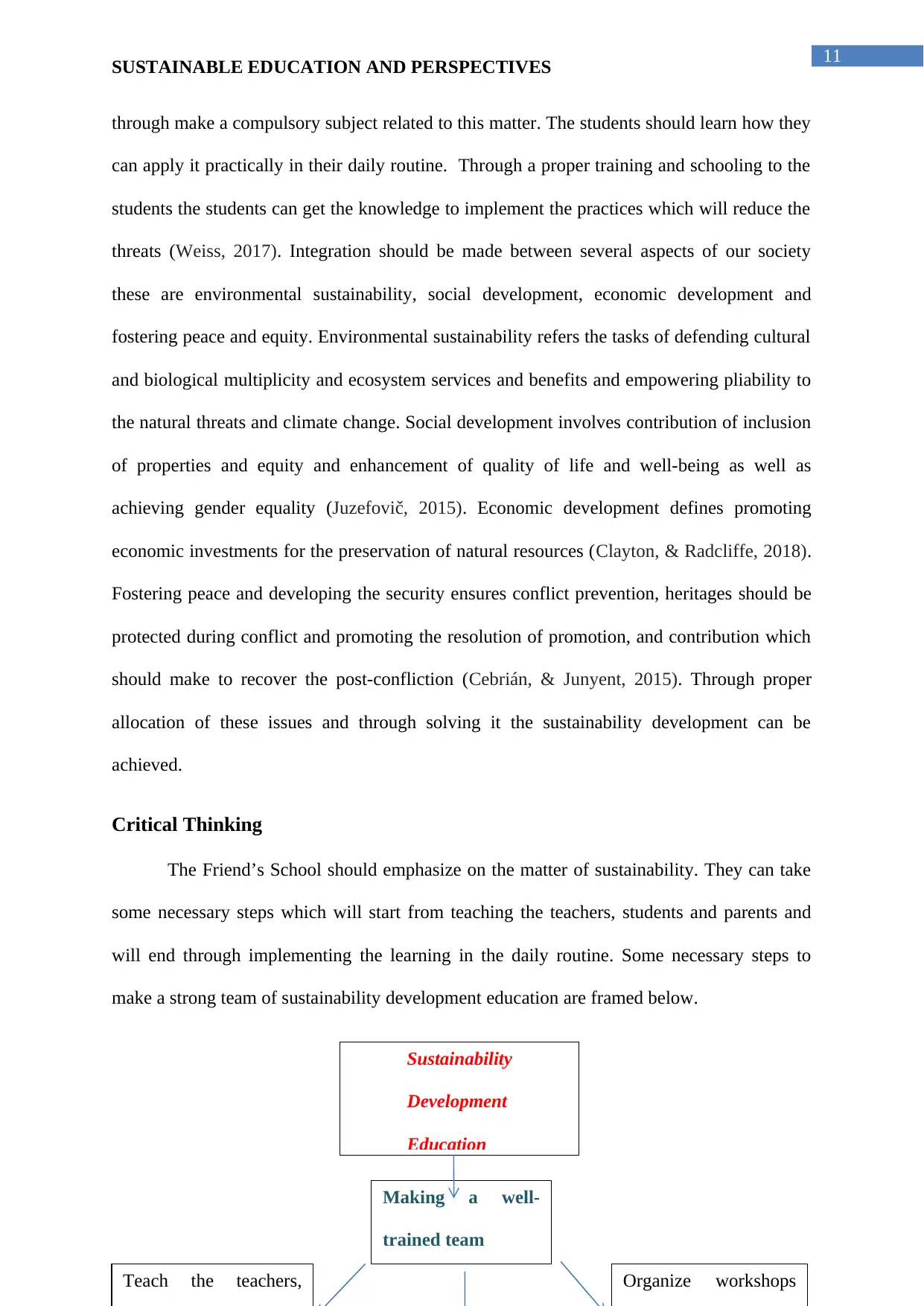
11
SUSTAINABLE EDUCATION AND PERSPECTIVES
through make a compulsory subject related to this matter. The students should learn how they
can apply it practically in their daily routine. Through a proper training and schooling to the
students the students can get the knowledge to implement the practices which will reduce the
threats (Weiss, 2017). Integration should be made between several aspects of our society
these are environmental sustainability, social development, economic development and
fostering peace and equity. Environmental sustainability refers the tasks of defending cultural
and biological multiplicity and ecosystem services and benefits and empowering pliability to
the natural threats and climate change. Social development involves contribution of inclusion
of properties and equity and enhancement of quality of life and well-being as well as
achieving gender equality (Juzefovič, 2015). Economic development defines promoting
economic investments for the preservation of natural resources (Clayton, & Radcliffe, 2018).
Fostering peace and developing the security ensures conflict prevention, heritages should be
protected during conflict and promoting the resolution of promotion, and contribution which
should make to recover the post-confliction (Cebrián, & Junyent, 2015). Through proper
allocation of these issues and through solving it the sustainability development can be
achieved.
Critical Thinking
The Friend’s School should emphasize on the matter of sustainability. They can take
some necessary steps which will start from teaching the teachers, students and parents and
will end through implementing the learning in the daily routine. Some necessary steps to
make a strong team of sustainability development education are framed below.
Sustainability
Development
Education
Making a well-
trained team
Teach the teachers, Organize workshops
SUSTAINABLE EDUCATION AND PERSPECTIVES
through make a compulsory subject related to this matter. The students should learn how they
can apply it practically in their daily routine. Through a proper training and schooling to the
students the students can get the knowledge to implement the practices which will reduce the
threats (Weiss, 2017). Integration should be made between several aspects of our society
these are environmental sustainability, social development, economic development and
fostering peace and equity. Environmental sustainability refers the tasks of defending cultural
and biological multiplicity and ecosystem services and benefits and empowering pliability to
the natural threats and climate change. Social development involves contribution of inclusion
of properties and equity and enhancement of quality of life and well-being as well as
achieving gender equality (Juzefovič, 2015). Economic development defines promoting
economic investments for the preservation of natural resources (Clayton, & Radcliffe, 2018).
Fostering peace and developing the security ensures conflict prevention, heritages should be
protected during conflict and promoting the resolution of promotion, and contribution which
should make to recover the post-confliction (Cebrián, & Junyent, 2015). Through proper
allocation of these issues and through solving it the sustainability development can be
achieved.
Critical Thinking
The Friend’s School should emphasize on the matter of sustainability. They can take
some necessary steps which will start from teaching the teachers, students and parents and
will end through implementing the learning in the daily routine. Some necessary steps to
make a strong team of sustainability development education are framed below.
Sustainability
Development
Education
Making a well-
trained team
Teach the teachers, Organize workshops
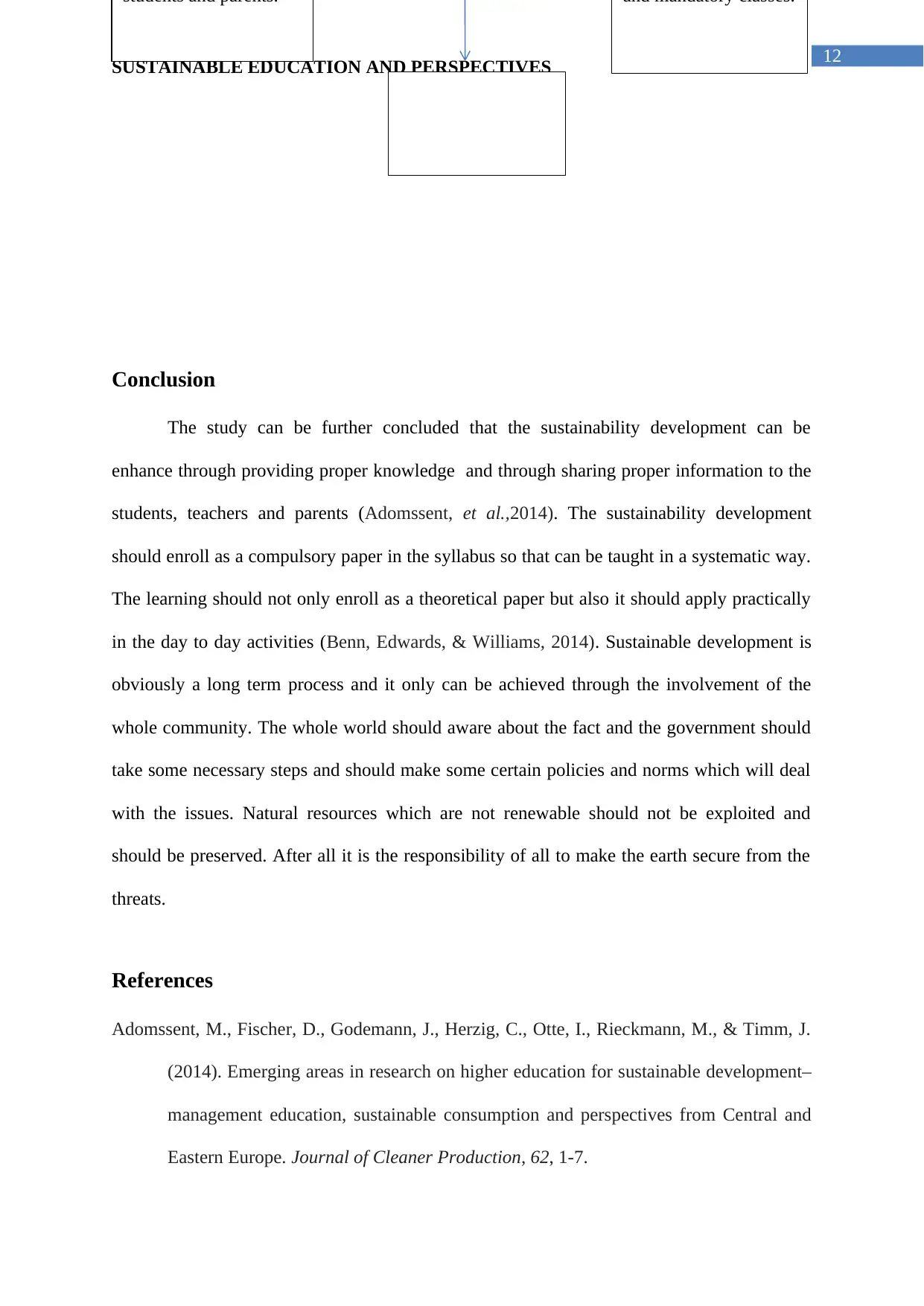
12
SUSTAINABLE EDUCATION AND PERSPECTIVES
Conclusion
The study can be further concluded that the sustainability development can be
enhance through providing proper knowledge and through sharing proper information to the
students, teachers and parents (Adomssent, et al.,2014). The sustainability development
should enroll as a compulsory paper in the syllabus so that can be taught in a systematic way.
The learning should not only enroll as a theoretical paper but also it should apply practically
in the day to day activities (Benn, Edwards, & Williams, 2014). Sustainable development is
obviously a long term process and it only can be achieved through the involvement of the
whole community. The whole world should aware about the fact and the government should
take some necessary steps and should make some certain policies and norms which will deal
with the issues. Natural resources which are not renewable should not be exploited and
should be preserved. After all it is the responsibility of all to make the earth secure from the
threats.
References
Adomssent, M., Fischer, D., Godemann, J., Herzig, C., Otte, I., Rieckmann, M., & Timm, J.
(2014). Emerging areas in research on higher education for sustainable development–
management education, sustainable consumption and perspectives from Central and
Eastern Europe. Journal of Cleaner Production, 62, 1-7.
students and parents. and mandatory classes.
SUSTAINABLE EDUCATION AND PERSPECTIVES
Conclusion
The study can be further concluded that the sustainability development can be
enhance through providing proper knowledge and through sharing proper information to the
students, teachers and parents (Adomssent, et al.,2014). The sustainability development
should enroll as a compulsory paper in the syllabus so that can be taught in a systematic way.
The learning should not only enroll as a theoretical paper but also it should apply practically
in the day to day activities (Benn, Edwards, & Williams, 2014). Sustainable development is
obviously a long term process and it only can be achieved through the involvement of the
whole community. The whole world should aware about the fact and the government should
take some necessary steps and should make some certain policies and norms which will deal
with the issues. Natural resources which are not renewable should not be exploited and
should be preserved. After all it is the responsibility of all to make the earth secure from the
threats.
References
Adomssent, M., Fischer, D., Godemann, J., Herzig, C., Otte, I., Rieckmann, M., & Timm, J.
(2014). Emerging areas in research on higher education for sustainable development–
management education, sustainable consumption and perspectives from Central and
Eastern Europe. Journal of Cleaner Production, 62, 1-7.
students and parents. and mandatory classes.
Paraphrase This Document
Need a fresh take? Get an instant paraphrase of this document with our AI Paraphraser
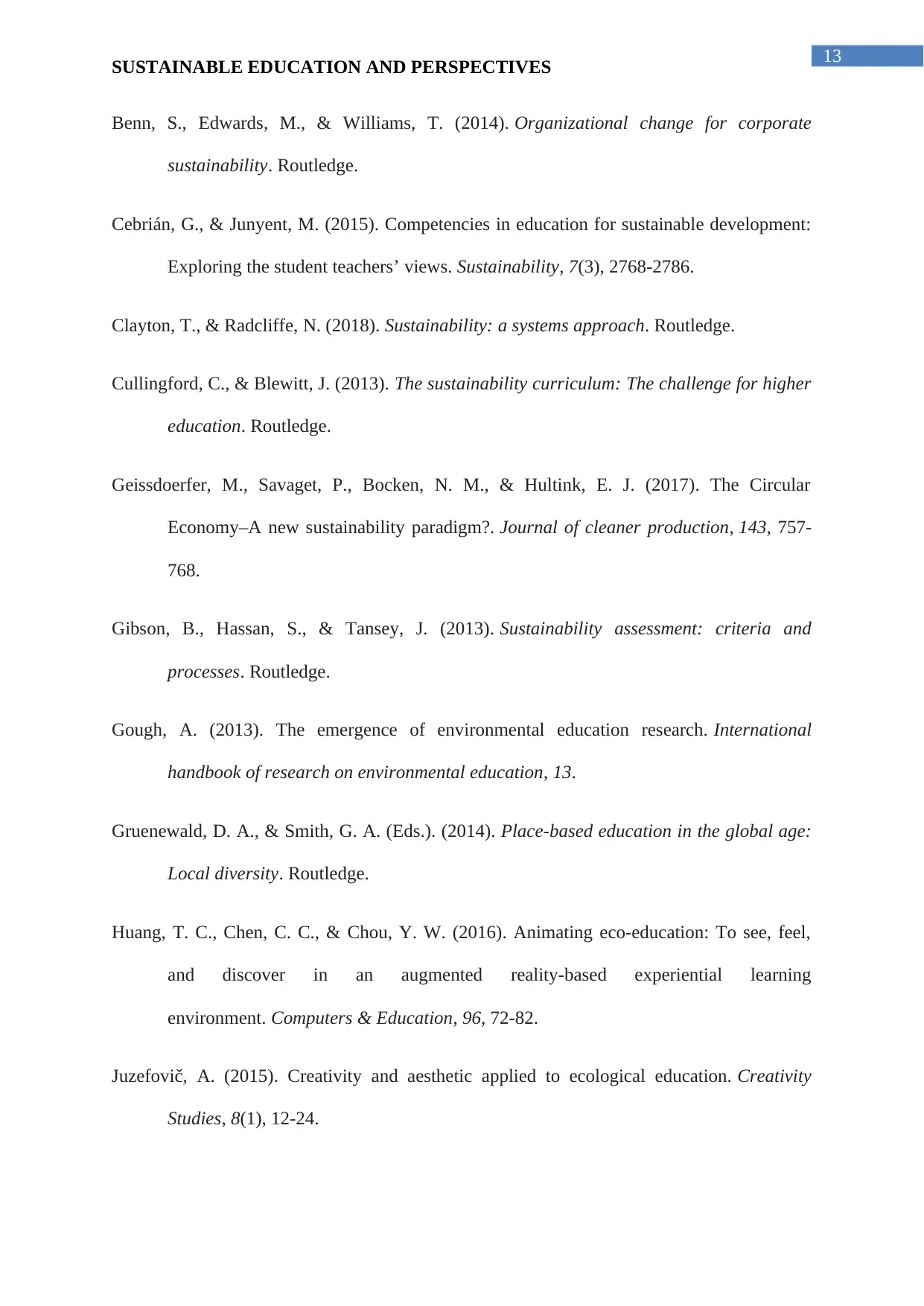
13
SUSTAINABLE EDUCATION AND PERSPECTIVES
Benn, S., Edwards, M., & Williams, T. (2014). Organizational change for corporate
sustainability. Routledge.
Cebrián, G., & Junyent, M. (2015). Competencies in education for sustainable development:
Exploring the student teachers’ views. Sustainability, 7(3), 2768-2786.
Clayton, T., & Radcliffe, N. (2018). Sustainability: a systems approach. Routledge.
Cullingford, C., & Blewitt, J. (2013). The sustainability curriculum: The challenge for higher
education. Routledge.
Geissdoerfer, M., Savaget, P., Bocken, N. M., & Hultink, E. J. (2017). The Circular
Economy–A new sustainability paradigm?. Journal of cleaner production, 143, 757-
768.
Gibson, B., Hassan, S., & Tansey, J. (2013). Sustainability assessment: criteria and
processes. Routledge.
Gough, A. (2013). The emergence of environmental education research. International
handbook of research on environmental education, 13.
Gruenewald, D. A., & Smith, G. A. (Eds.). (2014). Place-based education in the global age:
Local diversity. Routledge.
Huang, T. C., Chen, C. C., & Chou, Y. W. (2016). Animating eco-education: To see, feel,
and discover in an augmented reality-based experiential learning
environment. Computers & Education, 96, 72-82.
Juzefovič, A. (2015). Creativity and aesthetic applied to ecological education. Creativity
Studies, 8(1), 12-24.
SUSTAINABLE EDUCATION AND PERSPECTIVES
Benn, S., Edwards, M., & Williams, T. (2014). Organizational change for corporate
sustainability. Routledge.
Cebrián, G., & Junyent, M. (2015). Competencies in education for sustainable development:
Exploring the student teachers’ views. Sustainability, 7(3), 2768-2786.
Clayton, T., & Radcliffe, N. (2018). Sustainability: a systems approach. Routledge.
Cullingford, C., & Blewitt, J. (2013). The sustainability curriculum: The challenge for higher
education. Routledge.
Geissdoerfer, M., Savaget, P., Bocken, N. M., & Hultink, E. J. (2017). The Circular
Economy–A new sustainability paradigm?. Journal of cleaner production, 143, 757-
768.
Gibson, B., Hassan, S., & Tansey, J. (2013). Sustainability assessment: criteria and
processes. Routledge.
Gough, A. (2013). The emergence of environmental education research. International
handbook of research on environmental education, 13.
Gruenewald, D. A., & Smith, G. A. (Eds.). (2014). Place-based education in the global age:
Local diversity. Routledge.
Huang, T. C., Chen, C. C., & Chou, Y. W. (2016). Animating eco-education: To see, feel,
and discover in an augmented reality-based experiential learning
environment. Computers & Education, 96, 72-82.
Juzefovič, A. (2015). Creativity and aesthetic applied to ecological education. Creativity
Studies, 8(1), 12-24.
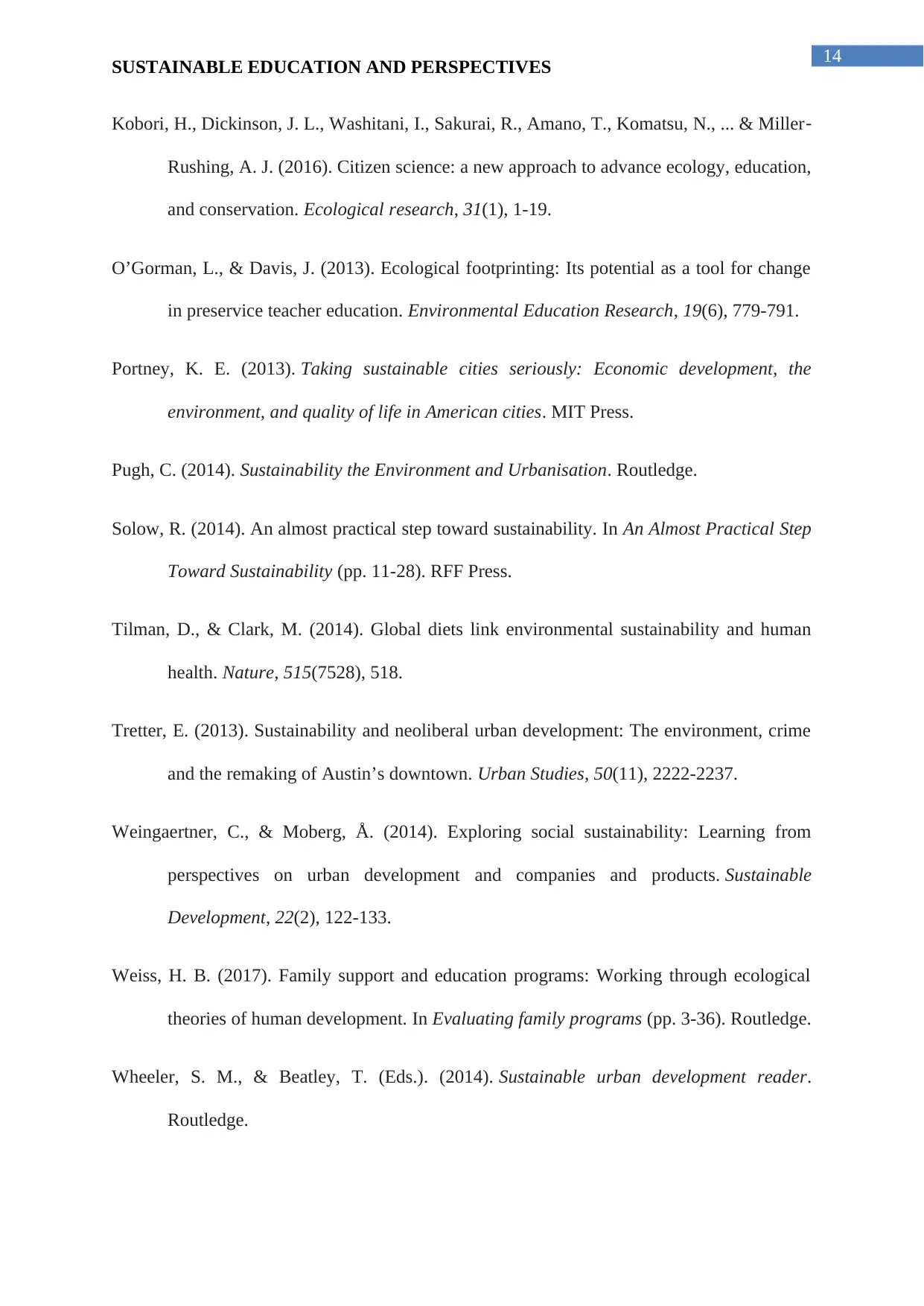
14
SUSTAINABLE EDUCATION AND PERSPECTIVES
Kobori, H., Dickinson, J. L., Washitani, I., Sakurai, R., Amano, T., Komatsu, N., ... & Miller‐
Rushing, A. J. (2016). Citizen science: a new approach to advance ecology, education,
and conservation. Ecological research, 31(1), 1-19.
O’Gorman, L., & Davis, J. (2013). Ecological footprinting: Its potential as a tool for change
in preservice teacher education. Environmental Education Research, 19(6), 779-791.
Portney, K. E. (2013). Taking sustainable cities seriously: Economic development, the
environment, and quality of life in American cities. MIT Press.
Pugh, C. (2014). Sustainability the Environment and Urbanisation. Routledge.
Solow, R. (2014). An almost practical step toward sustainability. In An Almost Practical Step
Toward Sustainability (pp. 11-28). RFF Press.
Tilman, D., & Clark, M. (2014). Global diets link environmental sustainability and human
health. Nature, 515(7528), 518.
Tretter, E. (2013). Sustainability and neoliberal urban development: The environment, crime
and the remaking of Austin’s downtown. Urban Studies, 50(11), 2222-2237.
Weingaertner, C., & Moberg, Å. (2014). Exploring social sustainability: Learning from
perspectives on urban development and companies and products. Sustainable
Development, 22(2), 122-133.
Weiss, H. B. (2017). Family support and education programs: Working through ecological
theories of human development. In Evaluating family programs (pp. 3-36). Routledge.
Wheeler, S. M., & Beatley, T. (Eds.). (2014). Sustainable urban development reader.
Routledge.
SUSTAINABLE EDUCATION AND PERSPECTIVES
Kobori, H., Dickinson, J. L., Washitani, I., Sakurai, R., Amano, T., Komatsu, N., ... & Miller‐
Rushing, A. J. (2016). Citizen science: a new approach to advance ecology, education,
and conservation. Ecological research, 31(1), 1-19.
O’Gorman, L., & Davis, J. (2013). Ecological footprinting: Its potential as a tool for change
in preservice teacher education. Environmental Education Research, 19(6), 779-791.
Portney, K. E. (2013). Taking sustainable cities seriously: Economic development, the
environment, and quality of life in American cities. MIT Press.
Pugh, C. (2014). Sustainability the Environment and Urbanisation. Routledge.
Solow, R. (2014). An almost practical step toward sustainability. In An Almost Practical Step
Toward Sustainability (pp. 11-28). RFF Press.
Tilman, D., & Clark, M. (2014). Global diets link environmental sustainability and human
health. Nature, 515(7528), 518.
Tretter, E. (2013). Sustainability and neoliberal urban development: The environment, crime
and the remaking of Austin’s downtown. Urban Studies, 50(11), 2222-2237.
Weingaertner, C., & Moberg, Å. (2014). Exploring social sustainability: Learning from
perspectives on urban development and companies and products. Sustainable
Development, 22(2), 122-133.
Weiss, H. B. (2017). Family support and education programs: Working through ecological
theories of human development. In Evaluating family programs (pp. 3-36). Routledge.
Wheeler, S. M., & Beatley, T. (Eds.). (2014). Sustainable urban development reader.
Routledge.
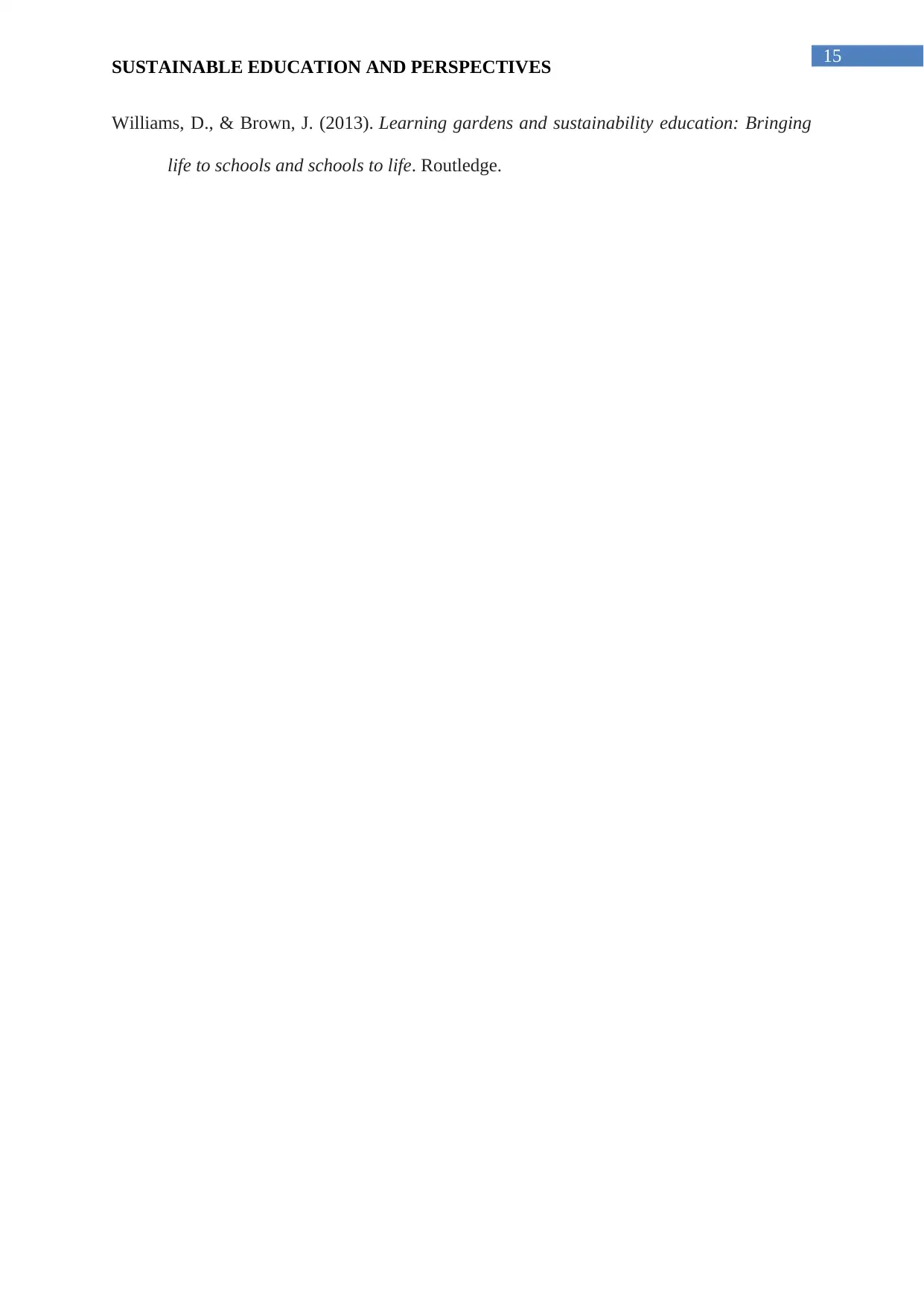
15
SUSTAINABLE EDUCATION AND PERSPECTIVES
Williams, D., & Brown, J. (2013). Learning gardens and sustainability education: Bringing
life to schools and schools to life. Routledge.
SUSTAINABLE EDUCATION AND PERSPECTIVES
Williams, D., & Brown, J. (2013). Learning gardens and sustainability education: Bringing
life to schools and schools to life. Routledge.
1 out of 16
Related Documents
Your All-in-One AI-Powered Toolkit for Academic Success.
+13062052269
info@desklib.com
Available 24*7 on WhatsApp / Email
![[object Object]](/_next/static/media/star-bottom.7253800d.svg)
Unlock your academic potential
© 2024 | Zucol Services PVT LTD | All rights reserved.




